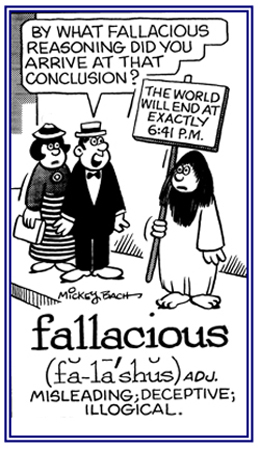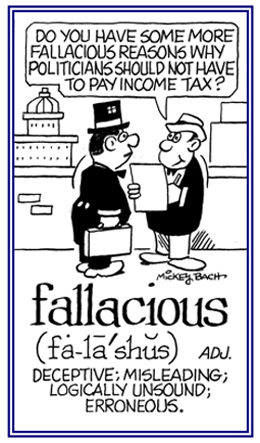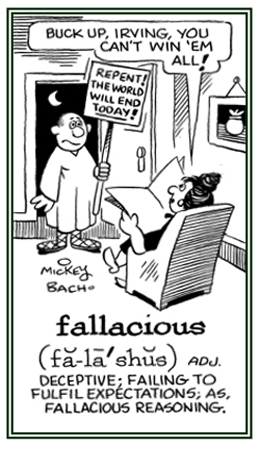fals-, fall-
(Latin: deception, untrue, incorrect; deceiving; contrary to truth and fact; lie)
Defaults are important for making computer systems behave in a predictable way without the user having to give lots of "obvious" details.
2. A lack of success in performing a task or in fulfilling an obligation: The default on the mortgage payments was a great concern to the bank.3. Not showing up at a required court appearance: The plaintiff was found in default of the court by not coming to the trial on time.
4. In sports, non participation in competition or not appearing to complete a competition: The home team won the championship by default because the opposing team didn't show up for the last game.
5. Etymology: from early 13th century, "offense, crime, sin"; then in the late 13th century, "failure, failure to act"; from Old French defaute (12th century), "fault, defect, failure, culpability, lack, privation"; from Vulgar Latin defallita, "a deficiency or failure"; past participle of defallere, from Latin de-, "away" + fallere, "to deceive, to cheat; to put wrong, to lead astray, to cause to be mistaken; to escape notice of, be concealed from".
2. Being unavailable in court although summoned to be there: Polly was fined by the court because she defaulted by not making an appearance as ordered by the judge.
3. Unable to appear for a game of sports or a contest when there was an agreement to do it: The flat tire on the bus caused the team to default on the game to which they were going.
4. With a computer, to use a device, a command, or a file when no other one is specified: Alisa's computer program defaults to a standard font whenever she uses it.
2. Not responding to a court summons: The judge was not impressed by the defaulter because this was the second time the plaintiff had chosen to default on a court appearance.
3. A person or team that doesn't appear for a scheduled game or contest: The home team was severely criticized because they were the defaulters at the critical game.
Sally went outside to take care of her flowers one morning when a sudden explosion took place in her kitchen because of some kind of electrical faults in her refrigerator that resulted in a severe fire in her apartment.
2. To be incapable of doing something or unwilling to do it: At least one student in class failed to understand the last question on the examination.
3. To fall short of the standard required to pass an examination, course, or piece of academic work: Shirley failed her Spanish exam because she didn't study the necessary assignments.
4. To judge that someone is not good enough to pass an examination, course, or piece of academic work: Mr. Smith had to tell three students that they had failed the science examination.
5. To stop working or not performing or growing as expected: The brakes on the car failed when Mary tried to stop her car before going through a red light.
6. To collapse financially or becoming insolvent or bankrupt: Janet's small business failed because new trade agreements did not allow her to import popular products.
7. To abandon, to forsake, or to let someone down by not doing what is expected or needed: June's neighbor failed her sister by being too late for their appointment.
8. To lose strength, loudness, or brightness: The light started to fail just when Alisa needed it.
9. Etymology: from Old French falir, Modern French faillir, "be lacking, miss, not succeed"; from Common or Vulgar Latin fallire; from Latin fallere, "to trip, to cause to fall"; figuratively, "to deceive, to trick, to dupe, to cheat, to elude"; fail, "be lacking" or "being defective".
The members of the committee thought that presenting the advantages of getting together for the project would be a good reason for combining their skills or, failing that, they would just have to cancel the proposal.
2. Not doing something successfully; such as, not passing a course of study or not working properly: Henry has had previous failings in his biology class at school.
3. A weak point that makes someone or something less effective: Sue has had several failings as a successful writer.
2. A condition or circumstance that is insufficient or which falls short of a desired objective: The crop failure was a major setback for the farmers.
3. A cessation of proper functioning or performance: After the storm, the entire town experienced an electrical power failure.
4. Nonperformance of what is requested or expected; an omission: Failure to report a change of address can result in problems with mail deliveries.
5. The act or fact of not passing an educational course, test, or assignment: Ralph didn't get any credit for his homework assignment because of his failure to follow his teacher's instructions.
6. A decline in strength or effectiveness: Howard was crippled by his fear of failure regarding his project.
7. The act or fact of becoming financially insolvent: Shanna went bankrupt because of her failure to find another job after her company moved to another country.
Failure phobias are generally caused by some influences of unproductive efforts that have resulted from prior situations which had occurred in people's lives that may have happened during childhood, marriage, special projects that were not accomplished, incapability of success in occupational endeavors, etc.
When Ivan asked his sister why she didn't come to his birthday party, he thought that her fallaciloquent excuses were the worst that he had ever heard.
2. Pertaining to something that is deceiving or based on untrue information or ideas: The testimony provided by the witness during the trial obviously consisted of several fallacious statements and so the accused was declared to be innocent of the charges.



Go to this Word A Day Revisited Index
so you can see more of Mickey Bach's cartoons.
The car was fallaciously presented as being in perfect condition, but it couldn't even be driven off the parking area.

